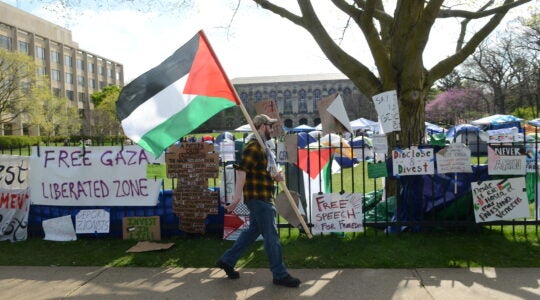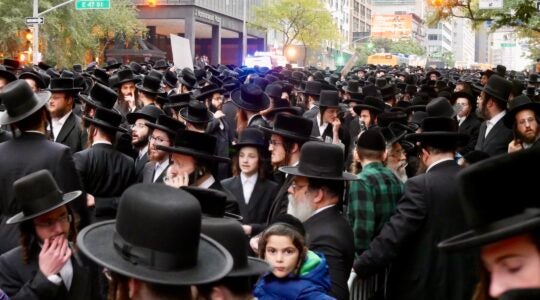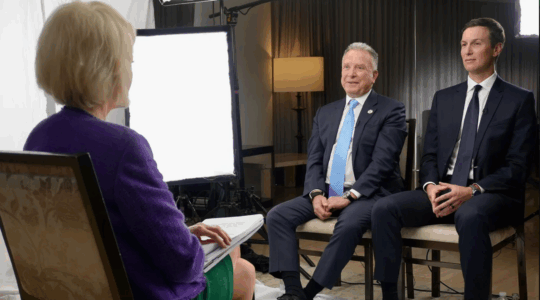WASHINGTON (JTA) – With hot-button domestic issues not expected to play a major role in the new U.S. Supreme Court session, Jewish groups are entering the fray over the right of judicial review for foreign detainees.
Several Jewish organizations have filed a joint friend-of-the-court brief in Boumediene v. Bush and Al Odah. v. United States, the Supreme Court’s third foray into the habeas corpus issue in recent years.
The combined case addresses laws allowing the president to indefinitely detain suspected combatants. Congress had enacted the laws in an effort to circumvent the Supreme Court’s earlier ruling that such detentions were illegal.
The joint amicus brief marks a re-entry into war-on-terror waters for a community that until recently has shied away from criticizing Bush administration tactics on such matters. Jewish groups had joined briefs in some cases and opted out in others.
Generally the organizations have been reluctant to weigh in on such cases with their traditional allies in the civil liberties community largely out of concern over potential terrorist attacks.
“This one we felt that it was important to have our voice heard,” said Deborah Lauter, the Anti-Defamation League’s national civil rights director, citing in part the length of time some alleged combatants have been held at the detention center in Guantanamo Bay, the patch of Cuba controlled by U.S. forces.
“Winning the war on terror is critically important,” Lauter said. “We must find a way to find security without undermining America’s respect for the rule of law and checks and balances.”
The conflict between backing an aggressive approach to suspected terrorists and preserving civil liberties led the American Jewish Congress to opt out of weighing in on the case. The group’s general counsel, Marc Stern, told JTA that the AJCongress board was split down the middle on the issue.
Jewish groups also are following a number of civil rights cases to be considered by the court this season. One involving a black manager fired by the Cracker Barrel restaurant chain addresses the question of whether laws banning racial discrimination extend to protecting whistleblowers from retaliation.
Another case revolves around the question of whether an Indiana law requiring voters to show photo identification amounts to discrimination against the poor and elderly, who are less likely to have drivers’ licenses. Democrats believe such laws are aimed at disenfranchising their party’s base voters.
“We have a concern here as to whether or not the photo ID can have the impact, a disproportionate effect on poor and elderly voters,” said Jeff Sinensky, the American Jewish Committee’s counsel.
The court turned away two church-state cases that might have had long-term consequences on hiring practices and religious practices on public property.
Among the decisions allowed to stand were an appeals court ruling upholding the refusal of a library in Contra Costa County in central California to allow religious services on its premises and a New York state Court of Appeals ruling compelling Catholic Charities to include contraception coverage in health plans for its employees.
The Orthodox Union slammed the Supreme Court for not taking the contraceptives case.
“The First Amendment demands appropriate exemptions and accommodations of religious practice and belief and demands we not tolerate laws which pick favorites among faith for protections,” an O.U. statement said.
Stern noted that the court has yet to decide whether to consider a case in Michigan, where advocates for Teen Ranch, a Christian camp, are seeking to overturn state policy that bans sending troubled youths to religious-based entities for detention and rehabilitation.
Should the court hear the case and uphold the ban, the decision would have far-reaching consequences for the Bush administration’s faith-based initiatives.
The lack of such cases on the calendar marks a sharp swing from the last session, which included landmark decisions rolling back some abortion rights and a rejection of the right of taxpayers to challenge government spending on religious groups.
Sammie Moshenberg, the Washington director of the National Council of Jewish Women, said last year’s decisions vindicated her organization’s sometimes lonely fight early in the decade to oppose conservative appointments to the federal courts. How judges are chosen is critical to how Americans live, she said.
‘”They should all live and be well, but you have a situation that because it comes down to nine individuals, you can have a vacancy at any time,” Moshenberg said. “We are maintaining our vigilance in terms of monitoring who gets onto the court.”
Lawyers for Jewish groups could only speculate as to why the church-state issue dropped off the docket this season.
Sinensky suggested a greater reluctance by secular rights groups to run their cases through the courts now that the court trends conservative, since swing vote Sandra Day O’Connor was replaced with conservative Samuel Alito in 2006.
“We always looked with great anticipation for the court to take a church state-case because we felt that more often than note the result would be favorable,” Sinensky said. “But in recent years, with the change in the composition of the court, we look with some trepidation on whether a church-state case makes its way up the docket. The fact there does not appear to be a church-state case is one that I’m pleased to see.”
Stern said another factor is that the four judges each on the conservative and liberal wings of the court have yet to get a handle on the remaining swing vote, Anthony Kennedy, who can be unpredictable. How the court votes in allowing cases to go forward – or not – is kept secret, but Stern said judges may be turning away those cases they fear Kennedy might rule against their wishes.
“The four on either side, when they’re not sure they can win or not, will not to seek to have a case they may think is wrongly divided,” Stern said.
Additionally, he said, justices seem to like to see how their major decisions – like those taken last season – are treated in lower courts before moving forward in an area.
“The court,” Stern said, “tends to let things percolate for a year or two to see how things work.”
JTA has documented Jewish history in real-time for over a century. Keep our journalism strong by joining us in supporting independent, award-winning reporting.





